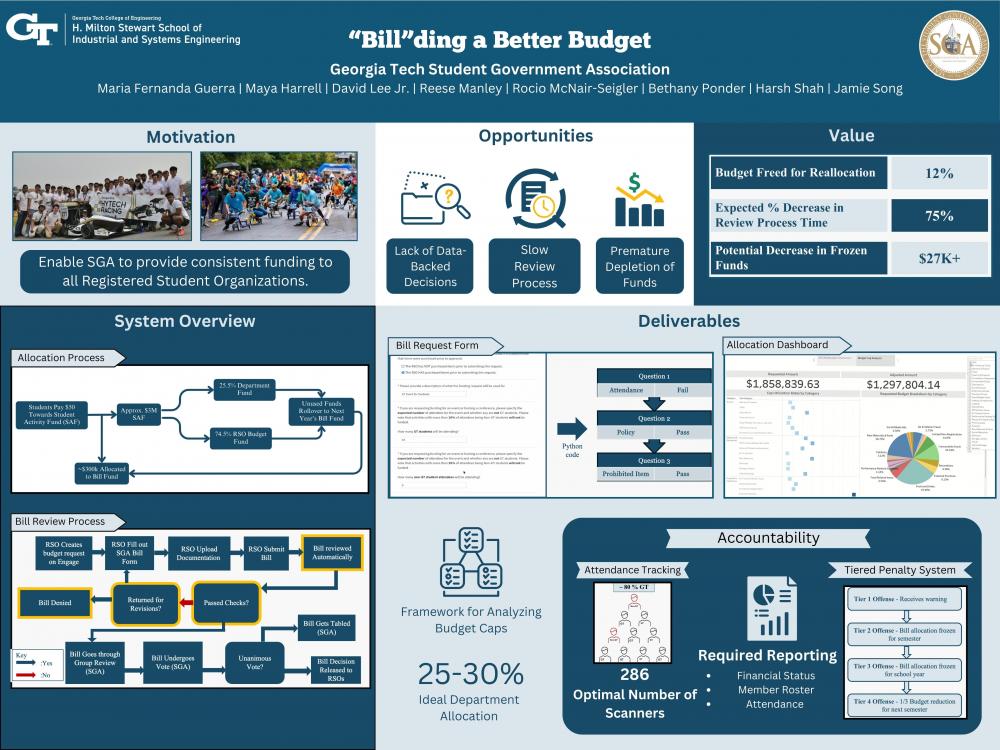Client Context
The Student Government Association (SGA) at Georgia Tech (GT) serves as the governing body for over 35,000 students. It is comprised of three branches: Executive, Legislative, and Judicial. For the purpose of this project, the Legislative branch is the most relevant, as it oversees the Joint Finance Committee (JFC), which sets policies and manages the distribution of the Student Activity Fund (SAF) under the leadership of the Joint Vice President of Finance. One of SGA's primary responsibilities is allocating the SAF to support Registered Student Organizations (RSOs).
Project Objective
Our purpose for this project is to enable SGA to provide consistent funding to all Registered Student Organizations. We have identified three key opportunities for improvement given the current state:
I. Reduce unused funds Deliverable - Data-Backed Allocation Framework to analyze historical data to recommend optimal funding allocation
II. Improving efficiency of funding allocation Deliverable - Automated review to speed up the Bill and Budget review process Deliverable - Dashboard to assist SGA in visualizing funding related data
III. Improving RSO compliance & data collection Deliverable - Standardized method of attendance tracking and data collection Deliverable - Audit & Penalty System to increase accountability & transparency.
Design Strategy
Deliverable 1: Data Backed Allocation
The Data-Backed Allocation Framework is designed with input from stakeholders—RSOs, department 4 staff, Georgia Tech students, and SGA members—provides a transparent and adaptable guideline for allocation decisions, benefiting both current and future administrations. Applied annually, the framework builds a dataset over time to improve decision-making. It accounts for constraints like maintaining Department Fund allocations at a minimum of 10% of the SAF and ensuring total allocations stay within SAF limits.
The Data-Backed Allocation Framework begins with preparing historical data, including aggregating RSO funding requests and approvals by sub-category from the previous fiscal year and calculating key metrics like utilization rates. Statistical and variance analyses are then used to identify under- or over-allocated areas. These analyses and their visual representations help identify locations in the system that are under or over-allocated. Caps should then be adjusted to reallocate funds from under-utilized to over-utilized pools, addressing under-allocation issues. For example, in FY 2024 the Printing Costs sub-category cap had a utilization rate of 25.75%, while the Raw Materials cub-category cap had a utilization rate of 147.43%. This signifies that SGA can reallocate available funds from the Printing Costs cap into the Raw Materials cap. This process should be repeated annually to align with demand and inflation.
Deliverable 2: Bill and Budget Review Process Automation and Dashboard
The primary goal of this deliverable is to enhance SGA's Bill and Budget application review process and improve communication with RSOs. Currently, SGA manually reviews hundreds of funding applications annually, but with an average 16% increase in funding applications each year and a limited eight-person funding review team, concerns have emerged about SGA’s ability to consistently meet the promised two-week response timeframe for Bill application review. By integrating automation and a centralized dashboard into the existing system, SGA can uphold its commitment to timely responses, introducing standardization in the review process, and increasing transparency with RSOs.
Deliverable 3: Attendance Tracking
The Student Government Association mandates that RSOs meet specific attendance policies to receive funding, such as requiring 75% of attendees at an SGA funded event to be Georgia Tech (GT) students. In addition, funding caps for certain items are based on the estimated attendance of events. For example, an event with fewer than 100 attendees can receive up to $500 for a speaker, while an event with fewer than 500 attendees can receive up to $2,500. 10 However, SGA currently has no way to validate whether organizations are following these policies, due to not collecting attendance data for these events. Difficulties in data collection by SGA are caused by RSOs using various attendance tracking methods (e.g., Google Forms, GroupMe Calendar, Engage) and limitations in exporting attendance data from SGA’s official platform, Engage, further hinders SGA’s ability to effectively allocate resources for funding over 1000 events each year. On average, RSOs that fail to track attendance have held in total, approximately $150,000 in unspent balances each year from fiscal years 2013 through 2023, contributing to funding delays for SGA. The lack of data on RSOs presents an opportunity to implement a standardized data collection method, leading to improved accountability and compliance of the Student Government Associations funding policies, stronger support for RSOs by unlocking the ability to observe trends, and increased system sustainability due to proper resource management.
Deliverables
Deliverable 1: Data Backed Allocation
The utilization rates range from 26% to 354%, indicating severe under-allocation of funds in some sub-categories and over-allocation in others. Through analysis of the current Department Fund, we found that $80,000 was left unspent in fiscal year 2023. Bill utilization never exceeded more than 50% of the rollover funding from the Department Fund and the Budget Fund, thus the $300,000 from the Bill Fund was untouched. After illustrating all these results to the client, they agreed on the need for recalibrating funding allocations using data-driven decision-making.
Based on further analysis, the team offers the following recommendations:
Department Fund Allocation: Scenario analysis revealed that a 25.5% allocation provides optimal utilization rates of 70.28% to 85.74%. This range ensures effective use of funds while maintaining a buffer for potential increases in salaries or event funding.
Bill Fund Allocation: The current $300,000 allocation to the Bill Fund is unnecessary, given the $1.5 million rolled over from the previous fiscal year. It is recommended that this amount be reallocated to the Budget Fund to address under-allocated sub-categories. This allocation should be used to 6 alleviate the financial burden of underfunded sub-category caps in the Bill and Budget Funds.
Bill Usage Reporting: RSOs should report specific Bill usage during bi-semester audits to better track and measure utilization.
Deliverable 2: Bill and Budget Review Process Automation and Dashboard
The team developed an interactive Tableau dashboard designed to provide insights into the funding application review process for the SGA. This dashboard allows the SGA to monitor funding submission statuses, evaluate key performance metrics, and identify areas for process improvement. The dashboard as illustrated in figure 6 is user-friendly and intuitive, requiring minimal technical expertise to operate. Upon accessing the dashboard, users are presented with a range of visualized data, including submission trends, error rates, and budget allocation statistics. SGA can get real-time visibility on the effectiveness of the review and continuously optimize it. SGA, for instance, can tap the dashboard to find RSOs that frequently submit with an error and proactive provide training sessions to avoid this problem. The dashboard also enables SGA to track budget use patterns and cap funds or reallocate excess funds to make sure money gets distributed in a fair way. The dashboard can also highlight processing delays allowing SGA to assign priority to specific submissions and keep to the same timeline. The dashboard as a whole is a visual support to the automation mechanism, enabling you to make data-driven decisions and get visibility.
Deliverable 3: Attendance Tracking
The team constructed a data pipeline within Google Sheets to connect attendance reports from each of the 150+ RSOs that request funding. RSOs will be assigned an individual attendance tracking spreadsheet with pre-defined columns and formulas that process the data from the scanners in a standardized fashion. These spreadsheets are linked to a dashboard that updates in real-time, with key metrics on the first sheet that flags events and RSOs for compliance issues, displays their attendance discrepancies, and whether any follow-ups of certain events are necessary. To address any potential additional strain this new attendance requirement may cause on RSOs and SGA, it is recommended that SGA provides USB magnetic card scanners that can read the strip on a student’s Buzzcard (GT Student ID) and output the data onto a spreadsheet, which aligns with SGA’s existing data pipeline. This option was chosen as RSOs are already familiar with the scanners because they are integrated into daily operations at Georgia Tech (e.g., meal swipes). Additionally, 90% percent of surveyed RSOs have expressed willingness to adopt this solution, and the client has confirmed their approval of this approach. These scanners cost approximately $20 each and at our recommended number of 286 scanners, the total upfront cost for the Student Government Association would be approximately $5,720, which is more than offset by the benefit attained by preventing funds from being overallocated due to attendance overestimation. Of the 20 events the team audited, organizations overestimated attendance by an average of 24.3%, which contributed to $27,069 worth of funds being overallocated.
Policy Deliverable
To further ensure RSO compliance it is also our recommendation that SGA collect data from RSOs twice a semester, once in the middle and then at the end. This collection would be mandatory for RSOs to be in compliance with SGA to receive funding. RSOs would be required to submit member rosters, event attendance, and the usage of bills budget. These reports will support the data foundation for the other deliverables. The policy aims to encourage RSOs to report any outside funding received and to increase the number of RSOs that return unused funds at the end of each semester. Violations seen in the reporting and other offenses will be penalized in a tier strike system.
Value and Impact
This project addressed critical inefficiencies in SGA's funding allocation processes, leading to significant improvements in equity, transparency, and resource utilization. By implementing a data-backed allocation framework, automating the Bill and Budget review processes, and introducing a standardized attendance tracking system, the team has enabled SGA to align funding decisions with actual RSO needs, reduce processing time by 78%, and minimize overallocations caused by attendance overestimation. The unanimous approval of Bill 25J012 by the Georgia Tech House of Representatives and Senate demonstrates widespread support for these reforms and ensures their institutionalization. This policy creates the Financial Data Committee, which will apply these methodologies annually, providing data-driven recommendations to optimize the Student Activity Fund allocation. These solutions lay the foundation for sustainable, effective funding practices that will benefit Georgia Tech's student organizations for years to come.


